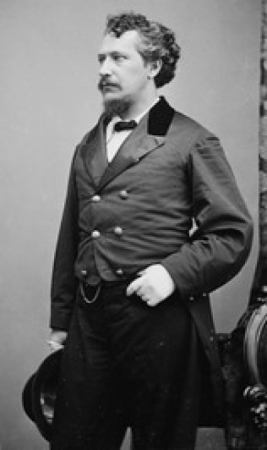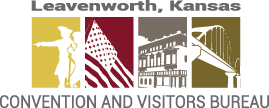Stumping at his own expense: George Francis Train in Leavenworth, 1867
By Bernadette Cahill
On October 21, 1867, “A tall handsome man with curly brown hair and keen gray eyes” dressed in “lavender kid [gloves], black pants, closely buttoned blue coat with brass buttons, and patent leather boots,” stepped up to speak at Laing’s Hall, here in Leavenworth.
This was George Francis Train – long famous as a successful worldwide businessman, shipping magnate, author and journalist – who was now a railroad and real estate promoter with presidential aspirations.
That day, he was in town to support women, for Republicans, white men, and black men were marginalizing a referendum before the white male electorate for women’s right to vote. The train would campaign with Susan B. Anthony to try to win women Democratic support.
Ahead of Train’s appearances, newspapers advised readers not to miss him. “He is one of the sights of this showy country, and his visit here … will constitute an agreeable episode in the hum-drum of life,” wrote one. “You had better hold your meetings out of doors if you wish to be accommodated,” warned another.
Large audiences from long distances would soon appear for Train even on short notice. An immense crowd filled Laing's Hall, “a goodly proportion of the audience being ladies.” Train spoke for two hours, talking “with his eyes, his hands, his legs as well as his mouth,” and he was “enthusiastically applauded throughout.” Afterwards, ‘the audience did not seem inclined to leave.”
Laing’s Hall was similarly packed for Train after ten days and thirty speeches elsewhere – on November 4, the day before the vote.
“Our town has not been so stirred up for a generation as it has been by Geo. Francis Train in his recent display of fireworks,” the Commercial reported. “He swung all around the circle of knowledge and trod on everybody's toes with impunity. Yet all applauded and cheered sentiments which would have sent another speaker off the stage.”
The train was worth traveling miles for: he entertained his audiences with irreverence; he thrilled them with new ideas dismissed by the establishment; and he made them laugh with jingles lampooning opponents of woman suffrage and what Train called outdated policies in a new, young America.
This “people's man” called for women to “vote and … help … elect in 1868 a President who don't drink, smoke, chew, swear or gamble. Who is not a Hero or a [Lawyer or a] Politician – who never held public office – whose statesmanship covers all parts of our nation” – and who “stumped it” at his own expense. These facts, Train’s ideas – and proposed policies such as an eight-hour day and how to pay off the Civil War debt – elicited loud cheers and wild applause.
Train’s meetings were “a magnificent success … a scene of rich and racy enjoyment, such as is not witnessed once in a century in a political gathering.” He helped win nearly 10,000 votes for the woman suffrage referendum – close to the total for black male suffrage. Neither measure passed, but Train’s support of the women in Kansas helped turn widespread opposition into a respectable support for the idea.
Citation for Photograph:
George Francis Train (Library of Congress Prints and Photographs Division Washington, D.C.)



